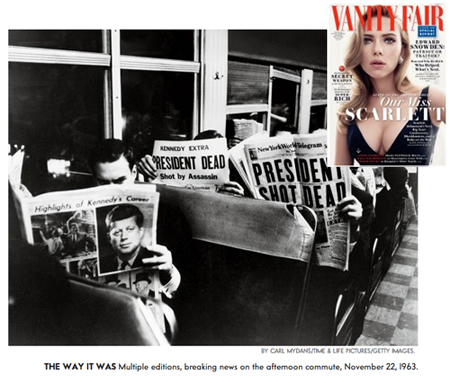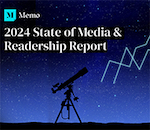 Political writer Michael Kinsley, in a debut column in Vanity Fair, says most local newspapers are not “very good” and that national newspapers like New York Times and USA Today, which “everyone can read,” will survive.
Political writer Michael Kinsley, in a debut column in Vanity Fair, says most local newspapers are not “very good” and that national newspapers like New York Times and USA Today, which “everyone can read,” will survive.
Kinsley, whose work has appeared in the Washington Post, New Republic, Harper’s and other media, says there is still a demand for excellent reporting which can be supplied by the national papers.
Local papers, which had monopolies, lost it when the web came along because, “Instead of being the only newspaper in town, every English-language daily in the world is competing with every other one,” he writes.
Lots of newspaper content is being stolen by sites using the “fancy name of ‘aggregation’ or the even fancier name of ‘curation.’”
Ads Won’t Influence NYT
He interviewed NYT CEO Mark Thompson who told him the intention of the paper is to reduce reliance on advertising and increase services and charges to those who can afford to pay for premium content and accessibility.
Thompson told Kinsley that news will not be influenced by advertisers, a message that was also given by NYT executive VP of advertising Meredith Levien to the Arthur W. Page Society April 3.
Kinsley wrote: “’Native advertising’ is the delightful but bewildering euphemism for advertising that looks like editorial content. Its main effect is to make editorial content look like advertising.”
Levien told the Page meeting that NYT is carrying “branded content” by Dell and Cartier but the paper is “not in any way compromising our editorial independence.”
The same message was given to the Page meeting by panelist Katherine Graham Weymouth, publisher and CEO of the Washington Post.
Post, Globe Sold for Low Prices
Kinsley noted that NYT bought The Boston Globe in 1993 for $1.1 billion but had to sell it for $70 million in 2013. Jeff Bezos, CEO of Amazon, picked up the Post for “pocket change” of $250 million, he added.
Bezos, though, has made reading on e-books acceptable and profitable, he says.
“His legitimization of electronic reading will be seen as a far more important contribution to saving newspapers than his purchase of the Post.”
Partial credit is also given to Bezos for increasing the willingness of people to pay for online content.
Newspaper Ad Revenues Down 6.5%
Newspaper ad revenues, including digital, mobile ads and other sources, declined 6.5% to $23.79 billion in 2013, according to statistics released today by the Newspaper Assn. of America.
Print ads fell 8.6% to $17.3B after a 6.8% decline in that category in 2012. Print ads were $46.6B in 2006.
- Revenue from digital channels — advertising, circulation, digital marketing services, and other — rose 5.8% and accounted for 12% of total industry revenue.
- The group of newly-developing and other revenue increased 5% overall. The component of digital agency and marketing services, where newspaper media companies tap into interest among local businesses in the digital environment, increased 43%.
- Digital advertising rose to $3.42 billion and accounted for 19% of advertising revenue; pure-play (digital only) advertising rose 14%. Mobile advertising revenue, though a small portion of overall total revenue (less than 1%), jumped 77%.


 Trump Media & Technology Group today reported a $58.2M net loss on $4.1M in 2023 revenues, a disclosure that drove its stock price down 22.6 percent to $47.96.
Trump Media & Technology Group today reported a $58.2M net loss on $4.1M in 2023 revenues, a disclosure that drove its stock price down 22.6 percent to $47.96. Barry Pollack, an attorney at Wall Street’s Harris St. Laurent & Wechsler, has registered Julian Assange as a client with the Justice Dept. “out of an abundance of caution.”
Barry Pollack, an attorney at Wall Street’s Harris St. Laurent & Wechsler, has registered Julian Assange as a client with the Justice Dept. “out of an abundance of caution.” Paramount Global to slash 800 jobs in what chief executive Bob Bakish calls part of an effort to “return the company to earnings growth"... Rolling Stone editor-in-chief Noah Shachtman is exiting at the end of the month due to disagreements with chief executive Gus Wenner over the direction the magazine is taking... The New York Times broke the $1 billion barrier in annual revenue from digital subscriptions in 2023... Press Forward is investing more than $500 million to strengthen local newsrooms.
Paramount Global to slash 800 jobs in what chief executive Bob Bakish calls part of an effort to “return the company to earnings growth"... Rolling Stone editor-in-chief Noah Shachtman is exiting at the end of the month due to disagreements with chief executive Gus Wenner over the direction the magazine is taking... The New York Times broke the $1 billion barrier in annual revenue from digital subscriptions in 2023... Press Forward is investing more than $500 million to strengthen local newsrooms. The majority of news articles are read within the first three days of publication, according to a recent report.
The majority of news articles are read within the first three days of publication, according to a recent report. The Los Angeles Times gives pink slips to 115 people or 20 percent of its newsroom staff... TIME is also laying off about 30 employees, which is approximately 15 percent of its editorial staff... The Baltimore Banner, which was launched by Stewart Bainum in 2022 after he failed to buy the Baltimore Sun, added 500 subscribers per day in the three days following Sinclair Broadcast Group's deal to purchase the Sun.
The Los Angeles Times gives pink slips to 115 people or 20 percent of its newsroom staff... TIME is also laying off about 30 employees, which is approximately 15 percent of its editorial staff... The Baltimore Banner, which was launched by Stewart Bainum in 2022 after he failed to buy the Baltimore Sun, added 500 subscribers per day in the three days following Sinclair Broadcast Group's deal to purchase the Sun.


 Have a comment? Send it to
Have a comment? Send it to 
No comments have been submitted for this story yet.